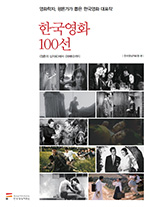
25,000won | 256 page | 189×257 | soft cover |
[ 100 Korean Films: from Turning Point of the Youngsters to Pieta ] 100 Korean Films: from Turning Point of the Youngsters to Pieta 2013 In celebration of the 40th anniversary of the establishment of the Korean Federation of Film Archives, reviews of 100 Korean movies selected by 62 movie scholars, movie critics and people involved in the movie industry were compiled together in one book. The meanings of the 100 Korean movies are re-illuminated by 52 prominent writers loved by the public with their in-depth knowledge, sensitivity and acute insight. |
| Writer/Researcher |
Kang Sung-ryul | Movie critic, professor at Kwangwoon University
Kang So-won | Movie Critic Kwon Eun-sun | Professor at Joongbu University Kim Kyung-wook | Movie critic, et. al. (48 persons) |
|---|---|
| Contents |
Contents
Greetings How 100 Korean Movies were Selected Brief Korean Movie History seen through Selected Movies Japanese Colonial Era From Liberation to the 1950s [Lost Korean Movies] In Search of Lost Pieces of Korean Movie and Movie History 100 Lost Korean Movies [Appendix] Index of Directors of 100 Korean Movies Selection Committee for 100 Korean Movies |